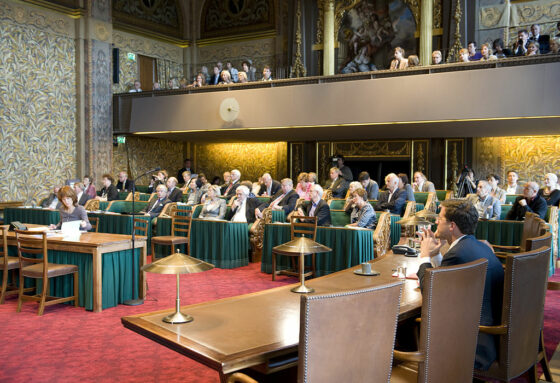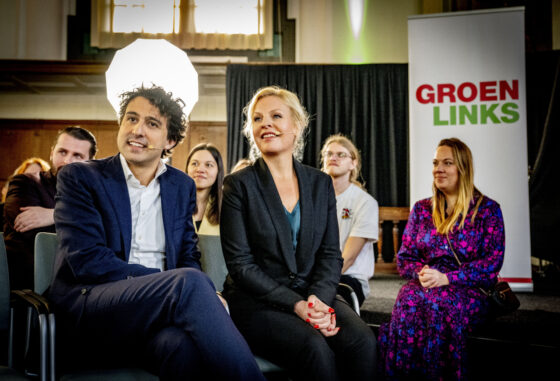Local elections: How the ‘powerful’ senate eclipsed the provinces


Keen followers of Dutch political debates in the last few weeks would be forgiven for thinking they were watching the wrong election.
Although voters are choosing members for the 12 provincial assemblies (Provinciale Staten) and 21 water boards for the next four years, the campaign has been dominated by issues such as tax rates, migration and asylum, none of which fall within the provinces’ jurisdiction.
Commentators have even speculated that a bad result for the four coalition parties – polls suggest they may only take around 20 of the 75 seats – could trigger a collapse of the cabinet and a general election.
The reason is that elections in the provinces double as an indirect vote for the Eerste Kamer, or senate. Historically the upper house has played second fiddle to the directly elected second chamber (Tweede Kamer): it sits one day a week, except during recess, and its members, though they represent political parties, are often veterans of the lower house or leaders in other branches of public life, such as the trade unions or the business community.
Though the senate has the absolute right of veto over all laws passed by the lower house, its constitutional role is to make sure bills passed by the lower house do not conflict with existing laws.
‘It’s one of the most powerful second chambers in the world,’ says Ruud Koole, a senator for the Labour party (PvdA). ‘But at the same time it’s a bit of a blunt instrument, because the only options are to pass or veto a bill. So the result is that the veto is used sparingly, because otherwise the country becomes ungovernable.’
But in the last 15 years the upper house has become more politically assertive. And that has everything to do with the decline of the mainstream parties in a fragmenting political landscape.
‘The biggest change is that since 2010 the Senate has had a different majority from the lower house,’ says Bert van den Braak, professor of parliamentary history at Maastricht University. ‘In the past, if the opposition voted against a bill it didn’t matter, but now it has consequences.’
The 75 senators are formally chosen by an electoral college of newly elected assembly members in May, using a system of weighted votes designed to make the outcome as proportional to the population as possible. So at the last election each of the 55 delegates from Zuid-Holland, with a population of 3.6 million, cast a block of 668 votes, while the 39 members of Zeeland’s assembly each had 98 votes.
Blocking tactics
During Mark Rutte’s four cabinet terms, the upper house has become a second-chance chamber for opposition parties to delay or reject laws that they were unable to block in the lower house. Last week the leader of GroenLinks, Jesse Klaver, said the coalition needed to come up with ‘more ambitious’ plans to speed up the transition to green energy, otherwise his party and Labour (PvdA) would vote against them.
Since opinion polls suggest that the four parties will need the support of GroenLinks and PvdA, who will sit as a joint group in the new senate, to pass their legislation, it was effectively an ultimatum.

‘The provincial elections have been completely dominated by the upper house election at the end of May, to an extent that I’ve never seen before’ says Koole. ‘It’s regarded very much as a verdict on the sitting cabinet. It always has been, but much more so now. The question has become whether there is a majority for Mark Rutte’s cabinet in the upper house, and I think it’s gone too far.’
Politicians from the coalition parties sometimes reproach senators for overstepping their traditional role, but the accusations are themselves often politically motivated.
During this month’s election campaign, the right-wing liberal VVD attacked the opposition in the upper house for being soft on crime after senators rejected a bill that would have made prison sentences mandatory for people who assaulted front-line workers such as police officers or ambulance crews. But the opponents, including coalition parties D66 and ChristenUnie, were concerned it would curtail the independence of judges – a classic senate objection.
One way the government has tried to head off resistance in the senate is by making deals with opposition parties in the lower house. ‘What you see then is that the voting pattern in both houses is aligned and if the cabinet has an agreement with the opposition parties, they won’t block it,’ says Van den Braak. ‘But that’s only necessary for a handful of bills, because the vast majority of legislation is uncontroversial.’
Koole is more concerned that the political nature of the modern senate has challenged its independence. ‘Sometimes parties see a decision in the lower house and react by saying: “We’ll vote against this in the upper house.” And I think: “What do you mean, vote against it in the upper house? You’re not the senators.”
‘The upper house has its own responsibility and its own criteria. It should never become a rubber-stamp machine for decisions made in the lower house.’
Part of the problem is that the Dutch parliament has no mechanism for resolving disputes between the two houses, Koole says. ‘Until 2010, we didn’t need one because the cabinet always had a majority in the upper house. But now there isn’t because of the electoral volatility. That’s changed everything.’
Revising chamber
The potential for conflict was illustrated in 2020 when the senate blocked the ratification of the Ceta trade treaty between the European Union and Canada. The lower house had passed the treaty four years earlier, when Rutte’s VVD was in coalition with the PvdA.
But in the wake of its devastating defeat in the 2017 election, Labour changed its leader and its policy on Ceta. The gridlock was only broken last July when the six PvdA senators, led by Koole, decided after ‘careful consideration’ to back the treaty.

The next senate could be a major obstacle to the government’s controversial plans for compulsory farm buyouts if, as predicted, the farmers’ party BBB becomes one of the largest groups. The coalition parties are pinning their hopes on the GroenLinks-PvdA alliance to secure the seats they need to make up a majority.
If the BBB holds its red line on compulsory farm purchases, the cabinet may have to turn to the hard-right JA21, which will drive a hard bargain on issues such as migration, or a hard-left group such as the Socialists (SP) or the animal rights’ party PvdD.
In the 1970s many parties, including the PvdA, argued the senate should be abolished or replaced by a constitutional court, but there was never a two-thirds majority in parliament, which is required for constitutional reform. Some parties, including D66 and Geert Wilders’s PVV, still support abolition, but the issue has dropped down the agenda.
‘The strange thing is that we used to talk about abolishing the upper house because it was pointless,’ says Koole. ‘Now if people talk about abolishing it at all, it’s because it’s become too powerful and too political.’
Koole favours making the upper house a revising chamber, with its veto only available as a last resort. ‘You could have a right to send laws back where senators have issues with details of the law. Then either the lower house could have the last word, or it could send the revised bill back to the upper house, who could still veto it, but only with a two-thirds majority.’
A two-thirds majority is also Van den Braak’s favoured solution, though in his version senators would be able to veto a bill with a two-thirds majority straight away. If a simple majority of the upper house voted against a bill, it would be sent back to the lower house. ‘That way you retain the ability to reject laws but only if there’s a broad mandate for doing it.’
Indirect elections
Koole says the risk with electing both houses directly is that they end up duplicating each other, especially if they are chosen at the same time. An alternative could be to retain the link with the provinces by electing the upper house on a regional basis rather than from national party lists.
‘The senate is elected by the provincial assemblies but on the basis of the national mandate, so there’s no real link with the provinces,’ he says. ‘If you had direct elections but with regional constituencies, that would give the upper house a different electoral base from the lower house.’
Both men agree that reforming the senate will be a slow and tricky process, but Van den Braak is puzzled that there is so little awareness of the problem. ‘A few years ago we had a national commission into the parliamentary system, but it completely avoided the fundamental question of why the senate is so powerful and whether we actually want that.’
Koole agrees there is a paradox in the fact that there is less debate about reforming the senate even though its role has become more controversial. ‘My view is that abolition is unlikely to happen, so we should focus on making sure it functions better, which means having a political role, but a restrained one.’
Thank you for donating to DutchNews.nl.
We could not provide the Dutch News service, and keep it free of charge, without the generous support of our readers. Your donations allow us to report on issues you tell us matter, and provide you with a summary of the most important Dutch news each day.
Make a donation